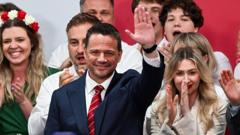As South Korea prepares for its presidential election on June 3, 2025, the front-runner, Lee Jae-myung, signals a potential turn in foreign policy, especially in regards to managing relations with North Korea and China. Under the recent administration of Yoon Suk Yeol, tensions escalated, primarily with North Korea, as Yoon adopted a confrontational stance that included a halt to diplomatic dialogues and a focus on liberalizing information into the isolated nation. This approach caused significant fallout, prompting North Korea to redefine its stance, regarding the South as a foe rather than a possible partner.
South Korea's Presidential Race: A Potential Shift in Diplomatic Strategy

South Korea's Presidential Race: A Potential Shift in Diplomatic Strategy
The upcoming election could lead to a significant realignment in South Korea's relationships with North Korea and China, driven by a shift in leadership preferences.
In a broader context, Yoon's presidency also complicated South Korea's diplomatic balancing act between its military ally, the United States, and its major trade partner, China. By siding more openly with Washington in the geopolitical tension between the U.S. and China, he worsened relations with Beijing, which responded negatively to accusations of interfering in South Korean politics.
Lee Jae-myung, poised to take over, advocates for stabilization of ties with China, arguing that Yoon's policies resulted in unprecedented dislike between the nations. While both Lee and his competitor Kim Moon-soo present policy platforms that largely overlap, Lee's inclination towards dialogue with North Korea and China could reshape the diplomatic landscape for South Korea.
The implications of the election extend beyond mere alliances; the new leadership will face the daunting task of mending disrupted connections while adhering to the complex realities of international relations in a region fraught with historical grievances and modern strategic challenges.
Lee Jae-myung, poised to take over, advocates for stabilization of ties with China, arguing that Yoon's policies resulted in unprecedented dislike between the nations. While both Lee and his competitor Kim Moon-soo present policy platforms that largely overlap, Lee's inclination towards dialogue with North Korea and China could reshape the diplomatic landscape for South Korea.
The implications of the election extend beyond mere alliances; the new leadership will face the daunting task of mending disrupted connections while adhering to the complex realities of international relations in a region fraught with historical grievances and modern strategic challenges.





















